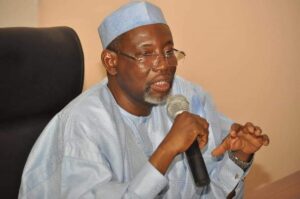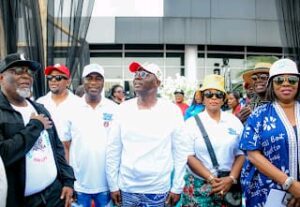2023: EU-SDG launches handbook on ‘electoral offences, penalties’
The European Union Support Democratic Governance (EU-SDG) in Nigeria, has launched a handbook on electoral offences and penalties, as part of efforts to create awareness on electoral offences ahead of 2023 general election.
The book, a guidance document for stakeholder, was launched at the EU-SDGN II Dissemination Seminar on Electoral Offences, organized by DAI in Abuja.
The DAI/EU-SDGN Team lead, Mr. Rudolf Elbing, speaking at the event, said that the handbook was developed by DAI with the support of the EU-SDGN programme.
Elbing said that DAI considered the document because, if the election was fraudulent or offences were committed in violations of the code of the regulations, guidelines and the law, democracy itself would be built on a very shaky foundation.
He said that the offences committed might lead in the long run to a government which is not trusted by the people.
Elbing added that offences may be committed by INEC officials, security officials, political associations, political parties and their officials, aspirants and or their agents.
He said that it could also be committed by party members, observers, service providers, journalists/media houses, or the public because elections are at the core of the democratic process.
“The competitive and politically divisive nature of elections in Nigeria makes them vulnerable to abuse, fraud, and violence.
“Elections can only be credible if they are conducted by an independent and professional Electoral Management Body (EMB) and contested on a level-playing field, in which the breach of laws and regulations is detected, reported, and prosecuted by the respective authorities.’’
Elbing said that the handbook would be useful to INEC, judicial officers and legal practitioners who may be involved in the trial of offenders.
He said that it would also be useful to academics, scholars, and students of electoral studies, electoral justice and administration; political parties, political associations, party functionaries and officials.
“It will also be useful to electoral candidates, party agents, party members and supporters, security agencies and agents who may be involved in electoral duty investigation activity or custody of offenders or material evidence.
“Media practitioners and institutions, electoral stakeholders including civil society, the media, election observers, service providers, development partners, etc, and the public, especially the voters,’’ he said.
Presenting the document, Okechukwu Ndeche advocated more awareness on the various electoral offences and the punishments stipulated by the various laws for such offences.
Ndeche, former Director of Operations and former acting Secretary of INEC, said it would serve as a preventive measure for such offences and improve the electoral process of the country.
“Offenses are best prevented but we know we cannot always prevent all offences.
“If Nigerians, political parties, candidates, observers and stakeholders are aware of these and are duly incorporated in our civil and voter education as a preventive measure, we believe that we may have peaceful and safer electoral process than we imagine,’’ he said.
A former INEC Director of Voter Education and Publicity, Oluwole Ozaze-Uzzi, who moderated the seminar, called for enforcement of the available electoral offences laws.
Ozaze-Uzzi said that Nigeria was not lacking in the provisions of law for electoral offenses but the major challenge was non-implementation of the available laws.
“Nigeria has probably the most comprehensive set of laws dealing with establishing offences.
“As they say, ‘it is one thing to have the laws, and another thing is to implement or enforce those laws.
“These laws keep being amended, they are not being enforced, but being amended. Penalties are always increased,’’ said Ozaze-Uzzi.
He said that the discussion would look into numbers of questions such as “are people being convicted? What are the challenges in terms of convictions?
“Why do we keep having low numbers of those convicted or do we have high numbers but are not publicized?
“What kind of deterrence can we put in place to ensure that these laws are to ensure that these laws are enforced?’’ asked Ozaze-Uzzi.
In their contributions, Mr. Alhassan Umar of INEC’s Litigating and Prosecuting Department, described the document as a veritable tool for INEC to prosecute electoral offenders going forward.
Umar said INEC was very happy about the document and would be happy to tap into it.
“This is the first time we have a document that warehouses Electoral Offenses both in the Electoral Act, the Constitution and others.
“Going forward, this will be a veritable tool for prosecuting electoral offenders. This handbook will be helpful to INEC to carry out its functions,” Umar said.
Deputy Commissioner of Police in the Operations Department, Mr. Aina Adesola, advised the electorate not to make themselves available for electoral offences.
Adesola said there was the need for establishment of institution to train minds and characters of Nigeria on the need to do the right thing.
“We have leaders and great people in Nigeria but what is lacking is building of characters. Punitive measures have not been solving problems but persuasion,’’ he said.




